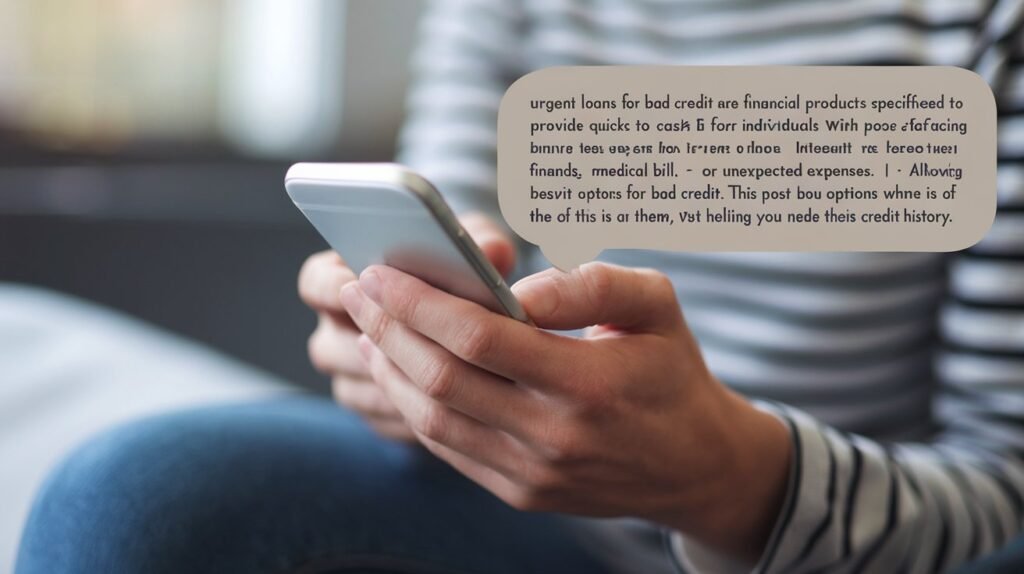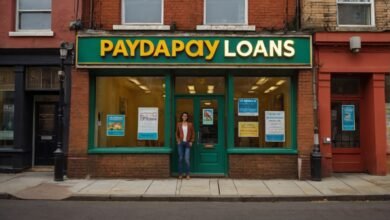Urgent Loans for Bad Credit: Fast Solutions When You Need Cash Now
Urgent Loans for Bad Credit

Urgent Loans for Bad Credit: Fast Solutions When You Need Cash Now
1. Introduction:
As for life, nobody knows, and it can surprise us with an out-of-the-blue financial emergency. Whether it’s an unexpected medical bill, an urgent home repair, or a sudden job loss, these situations demand immediate financial solutions. In an ideal world, people would have savings set aside for such emergencies. Reality, however, is very different from such ideal for most people. Nearly half of Americans struggle to cover a $400 emergency expense without borrowing money or selling personal items. For those with bad credit, this situation becomes even more challenging.
In such a case, what comes to your rescue are bad credit urgent loans. These loans are designed to provide quick access to cash for individuals who may not qualify for traditional financing options due to their credit history. While they can offer much-needed relief, it’s crucial to approach these loans with caution. Understanding the terms, fees, and potential risks involved is vital to making an informed decision during a financial crisis.
Urgent Loans for Bad Credit are financial instruments specifically engineered to provide immediate cash accessibility for those with poor credit scores. These loans cater to those facing immediate financial emergencies, such as medical bills, car repairs, or unexpected expenses, allowing them to secure funds quickly despite their credit history. This post delves into urgent loans for bad credit, helping you explore options when time is of the essence, and you need fast access to cash. Click here
Importance of Finding Fast and Reliable Loan Solutions:
When faced with an urgent financial situation, speed is often the most critical factor. You may not have the luxury of waiting days, or even weeks, for a loan application to be processed by traditional lenders. This is where the appeal of urgent loans for bad credit comes into play. These loans are specifically designed to provide immediate access to funds for those who need money fast, regardless of their credit history.
While urgent loans for bad credit can be a lifeline during challenging times, it’s essential to navigate this market carefully, understanding the terms and risks associated with borrowing money under such circumstances. High interest rates, short repayment terms, and potential debt traps are all considerations that should not be overlooked. The following sections of this blog will provide an in-depth guide to urgent loans for bad credit, exploring the types of loans available, how to qualify for them, and tips for making the best decision during financial crises.
2. Understanding Urgent Loans
Definition of Urgent Loans: What Makes Them Different from Regular Loans?
Urgent loans are designed to provide quick access to cash, usually in situations where financial needs cannot be delayed. Unlike traditional loans, which can take days or even weeks to process, urgent loans focus on speed—both in terms of approval and disbursement. Often, these loans are granted with minimal paperwork and fast turnaround times, with many lenders offering same-day or next-day funding.
What makes urgent loans unique is the process of applying for them. While traditional loans often require thorough background checks, credit history evaluations, and income verifications, urgent loans prioritize immediate funding. For example, an individual facing an unexpected medical bill or car repair cannot afford to wait for the lengthy approval processes typical of banks. Urgent loans fill this gap, offering a solution when time is of the essence.
Why They Are Popular in Emergencies:
Urgent loans for bad credit are particularly popular among individuals who have limited options during emergencies. A sudden financial crisis doesn’t wait for your credit score to improve, nor does it consider whether you have savings available. In these situations, the ability to access fast funding can prevent further financial damage, such as penalties for missed bill payments, eviction, or repossession.
For individuals with bad credit, traditional avenues of borrowing—such as bank loans or credit cards—are often closed. Banks view bad credit borrowers as high-risk and are less likely to approve loan applications from individuals with low credit scores. As a result, urgent loans for bad credit are appealing because they offer immediate financial relief without the extensive credit checks that are typical in traditional lending.
Situations When Urgent Loans Are Necessary:
There are countless scenarios where urgent loans for bad credit can become necessary. Here are some common situations:
- Medical Emergencies: Health problems can arise suddenly, leaving you with bills that need immediate payment. Hospitals and healthcare providers may require upfront payments, which can be challenging to cover without emergency funds.
- Car Repairs: For many individuals, having a functioning vehicle is essential for getting to work, attending school, or managing everyday tasks. If your car breaks down and needs immediate repairs, a lack of funds can disrupt your entire life.
- Utility Bills: Missing a payment on your utility bills can result in service disconnection, leaving you without electricity, water, or heating. In extreme weather conditions, such a loss can be dangerous, making it crucial to avoid lapses in service.
- Rent or Mortgage Payments: If you fall behind on rent or mortgage payments, you risk eviction or foreclosure. An urgent loan can help you cover these expenses and prevent severe financial consequences.
These are just a few examples of when an urgent loan might be necessary. It’s important to remember that while urgent loans can provide fast relief, they are not without risks, which we will discuss in later sections.
3. Challenges of Bad Credit:
Explanation of What Constitutes a Bad Credit Score:
Credit scores play a pivotal role in determining one’s eligibility for various financial products, including loans, credit cards, and even housing rentals. A bad credit score is typically defined as a score below 580, although different lenders may have varying criteria for what they consider “bad credit.” Several factors contribute to a poor credit score, including:
- Late or Missed Payments: One of the most significant factors affecting credit scores is payment history. Missing payments on credit cards, loans, or other financial obligations can lead to a decrease in your score.
- High Debt-to-Income Ratio: If you have a large amount of debt relative to your income, it indicates to lenders that you may have trouble managing your finances, which can lower your credit score.
- Bankruptcies and Defaults: Any bankruptcy or defaulting in a loan brings down your credit score considerably, making it difficult to obtain further credits in the future.
- Limited Credit History: Even if you haven’t made any financial missteps, a lack of credit history can result in a low score. Lenders often prefer to see a track record of responsible borrowing and repayment before approving loans.
How Bad Credit Affects Your Ability to Secure Loans:
Having bad credit can significantly hinder your ability to secure loans. Traditional lenders, such as banks and credit unions, rely heavily on credit scores to assess a borrower’s risk level. If your credit score is low, lenders view you as a high-risk borrower, meaning there’s a greater chance that you won’t repay the loan. As a result, they may deny your application altogether or offer loans with unfavorable terms, such as higher interest rates or shorter repayment periods.
For those with Urgent Loans for Bad Credit can provide an alternative route to securing necessary funds. However, it’s essential to be aware of the potential downsides, such as higher costs and stricter repayment terms.
The Stigma and Misconceptions Surrounding Bad Credit Borrowers:
People with bad credit often face stigma, with the assumption that they have been financially irresponsible or reckless. However, this is a misconception. Many individuals with bad credit have found themselves in difficult financial situations due to circumstances beyond their control, such as job loss, medical emergencies, or unexpected expenses. Rather than being a reflection of poor financial habits, a bad credit score can be the result of unfortunate life events.
In the context of urgent loans for bad credit, it’s important to remember that being a bad credit borrower doesn’t mean you’re out of options. Many lenders understand that people with poor credit scores may still need access to loans, and they have developed products to serve this segment of borrowers.
4. Types of Urgent Loans for Bad Credit:
There are several types of urgent loans for bad credit available, each with its own set of pros and cons. Understanding these options can help you make an informed decision when choosing a loan that suits your needs.
Payday Loans:
- What Are Payday Loans? Payday loans are short-term, high-interest loans, due normally on your next payday. They are designed to provide fast access to small amounts of cash—usually between $100 and $1,000.
- Advantages: Payday loans are easy to obtain, even for individuals with bad credit, as lenders often do not perform credit checks. The application process is quick, and funds can be deposited into your bank account within hours.
- Disadvantages: The biggest drawback of payday loans is their extremely high interest rates. The APR could often transcend 400% in many cases. This makes payday loans an expensive option, and if not repaid quickly, borrowers can find themselves trapped in a cycle of debt.
Personal Loans:
- What Are Personal Loans? Personal loans are typically unsecured loans that can be used for a wide variety of purposes, such as debt consolidation, medical expenses, or home repairs. Many conventional consumer loans need to have good credit; however, there are some lenders who specialize in giving consumer loans for those having bad credits.
- Advantages: Personal loans usually offer larger loan amounts and longer repayment terms than payday loans, making them a more flexible option. Some lenders also allow bad credit borrowers to qualify, though the interest rates may still be higher than those for borrowers with good credit.
- Disadvantages: Personal loans for bad credit may come with higher interest rates and stricter approval requirements. Additionally, the application process may take longer than that for payday loans, although some lenders offer expedited approval for urgent situations.
Installment Loans:
- What Are Installment Loans? An installment loan is just that: a loan where payments are made in installments for a fixed time period with fixed monthly payments. These loans can be secured or unsecured, and some lenders specifically cater to individuals with bad credit.
- Benefits: Any installment loan can give you the advantage of predictable month-to-month payments, which can really help you budget your payoff. They also typically provide larger loan amounts and longer repayment periods compared to payday loans.
- Disadvantages: While installment loans may be easier to manage than payday loans, they can still come with high interest rates for borrowers with bad credit. Additionally, missing payments on an installment loan can damage your credit further.
Title Loans:
- What Are Title Loans? A title loan is a secure loan based on the title of your vehicle as collateral. If you fail to repay the loan, the lender has the right to repossess your car.
- Advantages: Title loans can provide fast access to cash, and they are available to individuals with bad credit because the loan is secured by an asset. The application process is typically quick, and you can receive the funds within 24 hours.
- Disadvantages: The main risk with title loans is that if you are unable to repay the loan, you could lose your vehicle. Additionally, title loans often come with high interest rates and fees, making them a costly option.
Online Loan Options:
- What Are Online Loans? Many lenders now operate exclusively online, offering a range of loan products to borrowers, including those with bad credit. Of course, online lenders often have slightly less stringent requirements and are even considered much faster to process compared to the regular banks.
- Advantages: Applying for an online loan is convenient, as the entire process can be completed from your home. Many online lenders provide quick approval and funding, with some even offering same-day deposits.
- Disadvantages: Online loans for bad credit may still come with high interest rates and fees. It’s also important to research online lenders carefully, as the industry is rife with scams and predatory lenders.
5. How to Qualify for Urgent Loans with Bad Credit:
Common Qualifications Lenders Look for Besides Credit Score:
While a bad credit score can heavily limit your access to loans, most lenders providing urgent loans for bad credit focus more on other qualifications than the rating itself. Here are some of the factors your lender may consider:
- Income: A steady income is often the most critical factor for lenders when assessing your ability to repay a loan. Lenders may ask for proof of income, such as recent pay stubs or bank statements, to verify that you can meet your repayment obligations.
- Employment Status: Being employed or having a reliable source of income is crucial for loan approval. Some lenders may also consider self-employment income or other consistent revenue streams, such as government benefits.
- Bank Account: Most lenders require borrowers to have an active checking or savings account where the loan funds can be deposited. Having a bank account also allows for automated loan repayments, which can increase your chances of approval.
- Collateral: For secured loans, such as title loans, providing collateral can significantly improve your chances of approval. Collateral reduces the risk on the part of the lender, because if you do not repay the loan, they have an asset to recover.
Tips to Improve Your Chances of Approval:
- Provide Collateral: Offering collateral, such as your car or other valuable assets, can increase your chances of getting approved for a loan. Secured loans are less risky for lenders, which makes them more willing to lend to individuals with bad credit.
- Get a Co-Signer: Having a co-signer with good credit can improve your chances of loan approval and help you secure better terms. The co-signer agrees to repay the loan if you default, which provides an extra layer of security for the lender.
- Provide Evidence of Income: By showing that you have a steady income, you assure lenders that you would be able to repay the loan. This is particularly important for Urgent Loans for Bad Credit, where lenders may prioritize income verification over credit history.
-
Some specialize in bad credit loans, while others focus on payday or installment loans. Researching lenders who are known for working with bad credit borrowers can increase your chances of getting approved.
Importance of Income Verification and Employment Status:
Even if you have bad credit, demonstrating that you have a stable income can significantly improve your chances of loan approval. Many lenders offering urgent loans for bad credit will prioritize your ability to repay the loan over your credit score. If you can provide proof of consistent income—whether through employment, freelance work, or government benefits—lenders may be more willing to take a chance on you. Being transparent about your financial situation can also help establish trust with the lender and increase your likelihood of approval.
6. Risks and Downsides of Urgent Loans for Bad Credit:
High Interest Rates and Fees:
One of the most significant risks associated with urgent loans for bad credit is the high cost. Lenders who offer these loans often charge extremely high interest rates and fees to compensate for the risk of lending to individuals with bad credit. For example, payday loans can have APRs that exceed 400%, making them an incredibly expensive way to borrow money. Even personal or installment loans for bad credit can come with steep interest rates, especially if they are unsecured.
While the immediate access to cash may seem like a relief, failing to repay the loan on time can lead to more financial hardship, including additional fees and potential legal action from the lender.
Short Repayment Terms:
Another downside of many urgent loans is the short repayment period. Payday loans, for example, typically require repayment within two weeks or by the borrower’s next payday. For many, this can be a difficult timeframe to meet, especially if their financial situation hasn’t improved. Failing to repay a payday loan can result in rollover fees, which further increase the cost of borrowing.
Installment loans may offer longer repayment terms, but they also come with higher monthly payments, which can strain your budget if you’re already struggling financially.
Potential for Debt Traps:
Because of the high costs and short repayment terms, borrowers who take out urgent loans for bad credit may find themselves trapped in a cycle of debt. If you are unable to repay the loan on time, you may be forced to take out another loan to cover the cost of the first one. This can lead to a pattern of borrowing and repaying that becomes increasingly difficult to break, leaving you in a worse financial position than before.
7. Alternatives to Urgent Loans for Bad Credit:
Borrowing from Friends and Family:
If you are in need of immediate cash, borrowing from friends or family members may be a viable alternative to taking out a high-interest loan. While it can be uncomfortable to ask for help, friends and family are often more understanding and may not charge interest on the loan. Be very clear about the terms for repaying so as not to cause undue stress to your relationships.
Credit Union Loans:
Credit unions are member-owned banking institutions that normally provide better loan terms than regular banks. Some credit unions provide small-dollar loans to members with bad credit, and they may be more willing to work with you to develop a repayment plan that fits your budget.
Government Assistance Programs:
Depending on your situation, you may be eligible for government assistance programs that can help cover emergency expenses. For example, if you are facing eviction or utility shut-off, local and state programs may provide financial assistance or offer resources to help you manage your bills.
8. Conclusion:
Summarizing the Key Takeaways About Urgent Loans for Bad Credit:
In summary, urgent loans for bad credit can provide a lifeline for individuals facing financial emergencies. These loans offer quick access to cash, even for those with poor credit, and can be used to cover a variety of urgent expenses, from medical bills to car repairs. However, borrowers should be cautious of the high costs associated with these loans, including steep interest rates and short repayment terms.
Weighing the Pros and Cons Before Making a Decision:
While urgent loans for bad credit can offer immediate relief, they are not without risks. Before applying, it’s essential to weigh the pros and cons carefully. Consider whether you can realistically afford to repay the loan on time, and explore alternative options if available.
Encouragement to Use Loans Wisely and Plan for Future Financial Security:
Finally, it’s important to use urgent loans for bad credit responsibly. Borrow only what you need and make a plan for repayment before taking out the loan. Consider setting up an emergency fund in the future to avoid relying on high-interest loans during times of financial crisis. With careful planning and responsible borrowing, you can navigate financial emergencies while protecting your long-term financial health.
FAQs About Urgent Loans for Bad Credit:
1. What are urgent loans for bad credit?
2. How do I qualify for urgent loans if I have bad credit?
3. What types of urgent loans are available for bad credit?
4. What are the risks in borrowing at urgency for bad credit?
5. How can I make sure I choose the right lender?









